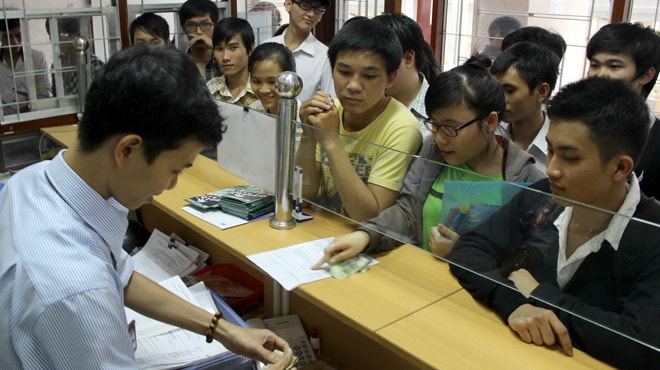Draft Law on Higher Education: "University autonomy" is unclear
However, some say the draft has not adequately addressed strategic issues of higher education.
 |
| The draft regulation stipulates that universities have autonomy in deciding on admission methods, but it says that the Minister of Education and Training issues admission regulations. In the photo: Candidates submit their application for the entrance exam at the University of Economics, Ho Chi Minh City - Photo: Nhu Hung |
Still vague
| "It is expected that at the end of 2012, the Party Central Committee will meet to discuss education and training, including higher education. The decisions of this meeting will be the basis for the State's policies on higher education. Obviously, there is still no strategy or policy, but jumping into making the Law on Higher Education first is a reverse process." Professor Pham Phu |
According to Professor, Dr. Nguyen Ngoc Tran, currently, higher education institutions are developing unevenly and most of them have not yet reached the standards of a real higher education institution, so the implementation of autonomy needs an appropriate roadmap.
“Thus, the draft limits this uneven situation. Unfortunately, the roadmap and what to do to gradually reduce this situation are not found in the draft. We only know that the limitation of autonomy depends on the stratification,” said Professor Tran.
Associate Professor Dr. Tran Canh Vinh, former principal of the Ho Chi Minh City University of Transport, said that many existing problems of higher education have not been clarified in the draft law. The system of universities under ministries is no longer suitable. There are currently many overlapping regulations of ministries that are "tying" these schools, which have not been clarified in the draft law on higher education. "Universities need to have autonomy in finance, personnel and organizational structure. This needs to be specifically shown in the draft law, otherwise it is still a matter of asking - giving" - Mr. Vinh said.
Associate Professor Dr. Nguyen Thien Tong, former Vice Principal of Cuu Long University, said that the law must be set up to promote change, while the law to legalize what already exists is very unreasonable. If a university is too specialized and under the direct control of a certain ministry or sector as it is now, it cannot be autonomous. A university must have enough qualified and knowledgeable people to manage itself and not need any intervention from anywhere. Meanwhile, most universities in Vietnam do not have this condition.
Meanwhile, Associate Professor Dr. Mai Hong Quy - Principal of Ho Chi Minh City University of Law - said that the Law on Higher Education needs to have provisions recognizing the autonomy of higher education institutions, creating conditions for higher education institutions to exercise their autonomy to improve the quality of training and scientific research. University autonomy is not the goal, it is only a means for society to have quality university products. Increasing autonomy for higher education institutions does not mean that the State has no role. The State needs to have changes in its intervention and the Law on Higher Education needs to have a clear mechanism for this intervention.
Professor Pham Phu, University of Technology (VNU-HCMC), commented: “The issue of university autonomy in this draft law is scattered and unclear. The issue of university councils has been raised, but the regulations on authority are still very general, not clarifying the role of the governing ministries.”
According to Professor Pham Phu, not all schools are equally autonomous. Only strong schools with real school councils are autonomous. Only when there is a strong school council that functions properly can autonomy be exercised. From there, the concept of the governing body disappears.
Walking on the edge of reality
Professor Nguyen Ngoc Tran commented: “Reading the draft law, I see that there are no major problems in the private university sector, while in reality there are many quite hot issues here, the core of which is whether a private university is a normal joint stock enterprise or a special one... I am afraid that the draft Law on Higher Education will go beyond the reality of private universities, and even more dangerously, hastily institutionalize the experiments (some right and some wrong) that the ministry is conducting.”
Similarly, Professor Pham Phu also said that the development of non-public universities is a very big issue that requires clarifying the issues of profit, non-profit and partial profit. The law completely avoids these issues. More specifically, in this issue, when talking about the board of directors, it only refers to the general meeting of shareholders, and the number of contributed shares only refers to private for-profit universities.
According to Associate Professor Dr. Tran Canh Vinh, many financial issues in the draft law are still unclear. “Internal spending regulations of higher education institutions are very important, but the draft law does not have any regulations on this. In addition to regulations on the use of tuition fees, state budget sources must be bid openly and transparently.”
Dr. Cao Van Phuong, principal of Binh Duong University, commented that the draft Law on Higher Education is too long, too detailed, but too general, assigning too many tasks to the minister and the Prime Minister, not creating autonomy for the institutions. The regulations on the tasks and powers of higher education institutions in the draft law seem "open", but then "tied" by other regulations. If the draft Law on Higher Education is passed, educational institutions must continue to wait for decrees and instructions and continue the request-grant mechanism.
Leaving the issue of the governing body open |
According to Tuoi Tre - H






